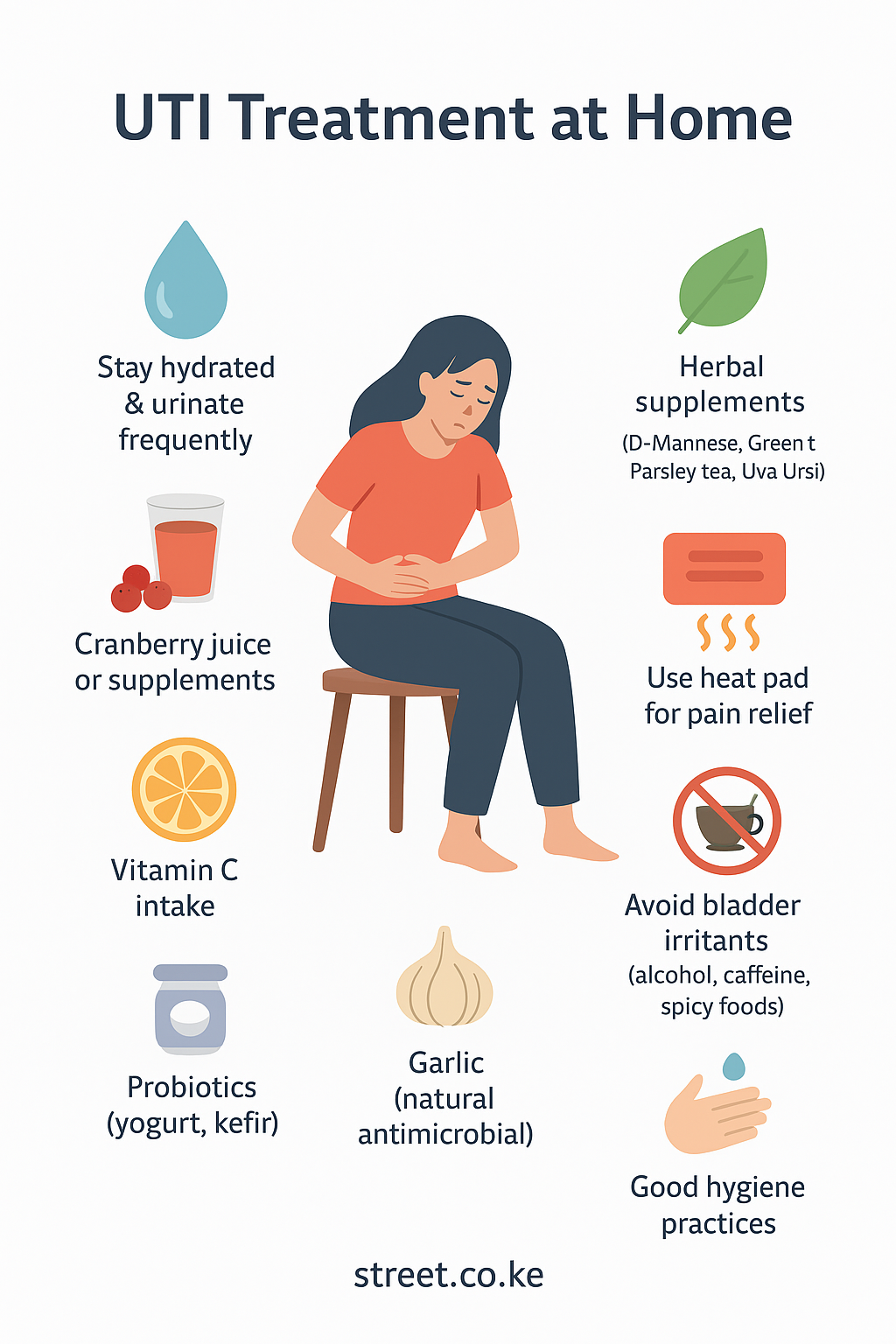Effective Home Remedies for UTI Treatment: A Comprehensive Guide
Urinary Tract Infections (UTIs) are among the most common bacterial infections, affecting millions worldwide. Over 400 million cases occur annually, with women being particularly susceptible due to anatomical differences. A UTI happens when bacteria, often E. coli from the gastrointestinal tract, enter the urinary system and multiply, leading to inflammation and discomfort. While antibiotics are the standard medical treatment, many seek home remedies to alleviate symptoms, support recovery, or prevent recurrence. These natural approaches can be appealing for mild cases or as complementary measures alongside professional care.
In this in-depth blog post for street.co.ke, we’ll explore UTI treatment at home, drawing from evidence-based insights. We’ll cover what UTIs are, their causes and symptoms, a variety of home remedies, when to seek medical help, and prevention strategies. Remember, this is for informational purposes only—UTIs can lead to serious complications like kidney damage if untreated. Always consult a healthcare professional before trying remedies, especially if you’re pregnant, have recurring infections, or underlying health conditions. Home treatments aren’t a substitute for antibiotics in bacterial infections, but they can provide relief and aid in flushing out bacteria.
Let’s dive in and empower you with practical, science-backed ways to manage UTIs from the comfort of home.
Understanding UTIs: Causes, Symptoms, and Risk Factors
To effectively treat a UTI at home, it’s crucial to understand what you’re dealing with. A UTI is an infection in any part of the urinary system, including the kidneys, ureters, bladder, or urethra. Most commonly, it affects the lower tract—the bladder (cystitis) and urethra (urethritis). Infections in the kidneys (pyelonephritis) are less frequent but more severe.
The primary cause is bacteria entering the urethra and traveling upward. E. coli, a bacterium commonly found in the gut, is responsible for about 90% of uncomplicated UTIs. Other culprits include sexually transmitted infections like chlamydia or herpes, which can cause urethral infections. In women, bacteria from the rectum can easily spread to the urethra due to its proximity to the anus.
Symptoms vary by the infection’s location but often include a persistent urge to urinate, burning sensation during urination, frequent small-volume urination, cloudy or bloody urine, and pelvic pain. Kidney infections may add fever, chills, nausea, vomiting, and back pain. In older adults, symptoms might mimic other conditions, like confusion or fatigue, making diagnosis tricky.
Risk factors amplify susceptibility. Women face higher risks due to a shorter urethra, hormonal changes during menopause (which alter vaginal bacteria), and certain birth control methods like diaphragms or spermicides that promote bacterial growth. Other factors include low fluid intake, constipation, incomplete bladder emptying, urinary tract blockages (e.g., kidney stones or enlarged prostate in men), weakened immunity from diabetes or medications, catheter use, and recent urinary procedures.
Complications from untreated UTIs are serious: permanent kidney scarring, low birthweight in pregnant women, urethral narrowing in men, or life-threatening sepsis if bacteria enter the bloodstream. Recurrent UTIs—two or more in six months—affect many, underscoring the need for both treatment and prevention.
Armed with this knowledge, you can better recognize early signs and opt for home remedies to mitigate mild symptoms while monitoring for escalation.
Home Remedies for UTI Treatment
While antibiotics are essential for bacterial UTIs, home remedies can ease discomfort, support the body’s natural defenses, and sometimes help resolve mild infections without medication—in about 20% of cases, UTIs clear up on their own with supportive care. Here, we’ll detail proven and popular options, backed by studies where available. Always start with professional advice to rule out complications.
1. Stay Hydrated and Urinate Frequently
One of the simplest yet most effective remedies is increasing fluid intake, particularly water. Aim for at least 1.5 liters (about 50 ounces) daily, unless contraindicated by conditions like kidney issues. Hydration dilutes urine, making it less irritating, and promotes frequent urination to flush bacteria from the bladder and urethra. Studies show that low fluid intake is a risk factor for UTIs, and boosting it can aid recovery by speeding bacterial clearance.
How to implement: Drink water steadily throughout the day, and don’t hold urine—empty your bladder every 2-3 hours or when you feel the urge. Combine with rest to allow your body time to heal. Avoid holding pee, as it lets bacteria multiply. This remedy is safe for most, but consult a doctor if you have fluid restrictions.
2. Consume Cranberry Products
Cranberries have long been touted for UTI relief, thanks to compounds like proanthocyanidins and D-mannose that prevent bacteria from adhering to urinary tract walls. Quinic acid in cranberries also has antibacterial properties. While evidence is mixed—a 2012 review found insufficient proof for treatment—some studies suggest it reduces recurrence, especially in women with frequent UTIs.
Usage: Drink unsweetened cranberry juice (8-16 ounces daily) or take supplements (e.g., 500mg capsules twice a day). Avoid sugary versions to prevent calorie overload. Side effects include stomach upset; skip if on blood thinners like warfarin, as it may interact. Long-term use might raise kidney stone risk.
3. Boost Vitamin C Intake
Vitamin C (ascorbic acid) acidifies urine, creating an inhospitable environment for bacteria. Higher dietary levels may prevent infections by inhibiting bacterial growth. Though direct studies on UTIs are limited, it’s a low-risk addition.
How to use: Eat vitamin C-rich foods like oranges, bell peppers, or strawberries, or take supplements (500-1000mg daily). Consult a doctor first, as high doses can cause diarrhea or interact with medications.
4. Incorporate Probiotics
Probiotics restore beneficial bacteria in the gut and urinary tract, potentially preventing E. coli overgrowth. They’re especially useful post-antibiotics to rebuild flora. Studies are conflicting, but risks are minimal.
Usage: Consume yogurt, kefir, or supplements (e.g., Lactobacillus strains, 1-2 billion CFUs daily). Vaginal probiotics may help women. Safe for most, but those with weakened immunity should check with a doctor.
5. Try Garlic
Garlic’s allicin has antimicrobial properties, showing activity against E. coli in lab studies. It may support immunity and target recurrent UTI strains. Human evidence is anecdotal, but it’s worth trying.
How to use: Eat raw garlic (1-2 cloves daily) or take supplements. May cause heartburn or odor; avoid if allergic or on blood thinners.
6. Explore Herbal Supplements
Several herbs show promise:
- D-Mannose: A sugar that prevents bacterial adhesion. Studies (e.g., 2013 trial of 308 women) found it as effective as antibiotics for prevention with fewer side effects. Dose: 1.5-2g up to 3x daily. Mild diarrhea possible; not for blood sugar issues.
- Uva Ursi (Bearberry Leaf): Contains arbutin with antibacterial effects against E. coli. An older study reduced recurrence. Use as tea or capsules (200-840mg arbutin daily) for 1-2 weeks max to avoid liver/kidney risks.
- Green Tea: Epigallocatechin (EGC) inhibits bacteria; animal studies suggest it boosts antibiotics. Drink 2-3 cups daily. Caffeine may irritate; opt for decaf.
- Parsley Tea: Diuretic effect flushes bacteria. Case reports show prevention potential with combos. Brew fresh leaves; limited evidence.
Always source quality supplements and consult professionals, as interactions or side effects can occur.
7. Use Heat Therapy
Apply a heating pad or hot water bottle to your abdomen or back to reduce bladder pressure and pain. Keep it warm, not hot, to avoid burns. This provides symptomatic relief without addressing the infection.
8. Avoid Irritants and Practice Good Hygiene
Steer clear of bladder irritants like caffeine, alcohol, citrus, and spicy foods. Wipe front to back, urinate after sex, and avoid scented products or douches to prevent bacterial entry.
Other options like apple cider vinegar (diluted in water for acidity) or baking soda (1/2 tsp in water to neutralize urine) lack strong evidence but are sometimes used for relief. Proceed cautiously.
These remedies, when combined, can significantly ease UTI discomfort and support healing.
When to See a Doctor
Home remedies are helpful for mild symptoms, but don’t delay medical care. Seek help if symptoms persist beyond 2-3 days, worsen, or include fever over 101°F, chills, vomiting, back pain, or bloody urine—these signal kidney involvement. Pregnant women, men, children, and those with recurrent UTIs need prompt evaluation. Untreated infections can lead to sepsis or chronic issues. Doctors may prescribe antibiotics like nitrofurantoin or trimethoprim for 3-7 days, or longer for complicated cases. For frequent infections, low-dose prophylaxis or post-sex antibiotics might be recommended.
Prevention Tips for Long-Term Health
Preventing UTIs is key to avoiding treatment altogether. Hydrate well, incorporate cranberries or D-mannose if prone to infections, and maintain hygiene: wipe front to back, urinate post-sex, and avoid irritating products. For women in menopause, vaginal estrogen may help. Manage constipation with fiber-rich diets and exercise. Switch birth control if it’s a trigger, and consider probiotics for balance. These habits can reduce risk by up to 50% in susceptible individuals.
Conclusion
Treating UTIs at home can provide relief and complement medical care, from hydration and cranberries to herbs like D-mannose. However, listen to your body and seek professional help when needed to prevent complications. By understanding UTIs and adopting preventive measures, you can maintain urinary health effectively. Stay informed and healthy—visit street.co.ke for more wellness tips!
By Angeline Otieno

